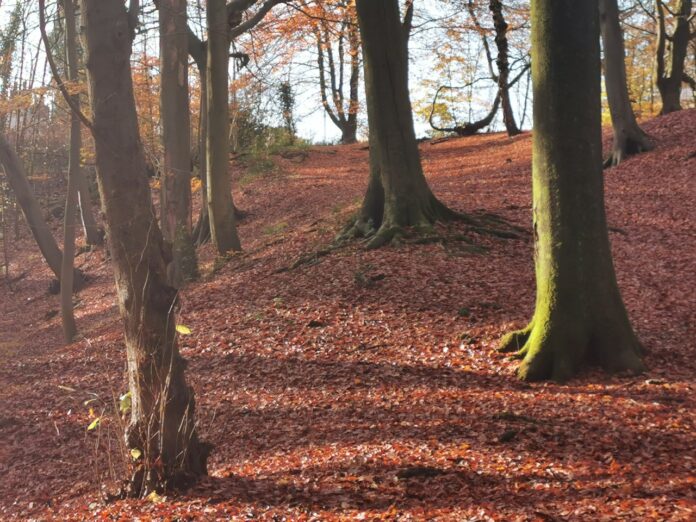85% of people who live or work in Greater Manchester think that the region is only moderately green, according to a recent study by The Royal Horticultural Society. Despite this, evidence from University of Manchester shows that 50% of urban Greater Manchester is actually green space, including parks, trees, playing fields and that around half of this urban green space is private gardens.
The coronavirus pandemic has brought into sharp reality how important our relationship to green space is for our wellbeing. As we continue to see the changes to our climate, we are increasingly valuing the performance of nature and green spaces to perform a technical role as well.
For instance, if greenhouse gas emissions continue to create a rise in global temperature, this could cause flooding incidents to double in the UK, with an additional one million homes exposed to high-risk flooding. Increasing and improving our green space and tree cover mean that the city region can soak up more water, reduce flooding, and cool our towns and city more easily during heatwaves.
As part of the nature-based solutions IGNITION project, University of Manchester mapped all of Greater Manchester’s green space to gather a baseline for the city region. The study found that over half of Greater Manchester’s urban areas are green or blue space, and about half of this urban green space is private gardens. Whilst this highlights what a large asset green space is to GM, it also shows the potential for residents with gardens to improve our capacity to cope with climate change and increase opportunities for wildlife.
As part of the same project the, the RHS surveyed over 2,000 Greater Manchester residents on their relationship to and understanding of green spaces and climate change. The results showed that 97% recognised that climate change is a risk for the city region, and whilst 80% value natures’ benefits for health and biodiversity, the benefits to help us cope with the effects of climate change were underestimated.
The 12-partner IGNITION project is aiming to encourage innovative investment into nature-based solutions across Greater Manchester.
A Climate Emergency was declared by the Greater Manchester Combined Authority (GMCA) in 2019, alongside the creation of the Five-Year Environment Plan that provides a resilience strategy to cope with the risks that climate change brings to the city region.
Cllr Andrew Western, GMCA Lead for the Green City-Region, said: “When it comes to the environment and climate change, we need to remember that these aren’t abstract issues – they concern the natural habitats right on our doorsteps. The ambition of the IGNITION project is to identify new and innovative ways to finance and increase the amount of urban green space within Greater Manchester. Evidence reviewed as part of the IGNITION project shows that high quality, well cared-for green spaces are vital to the long-term sustainability and resilience of our city-region.
“The impact of the pandemic, both economic and social, has only strengthened our resolve to build back as a cleaner, greener, and more resilient city-region. We continue to work with a wide range of partners like the IGNITION project on the goals set out in our Five Year Environment Plan to decarbonise Greater Manchester, improve air quality, protect our natural environment, and confront the challenges we all face.”
If Greater Manchester’s citizens tweaked their gardens to include more planting areas, trees or ponds, and fewer hard surfaces this could help their local community with reducing flood risk, improve their wellbeing, provide a home for wildlife, improve air quality and soak up more carbon. For those of us with limited space, there is still potential to feel these benefits as a recent RHS study found that installing ornamental planting in front gardens across northern England created a healthier pattern in the resident’s stress hormones.
Prof. Alistair Griffiths, Director of Science and Collections at the Royal Horticultural Society, said: “Gardening and green spaces has so much to offer the public and this study demonstrates just how much people value access to them. Combining this survey with the recent scientific evidence gathered on the benefits of plants on people’s physical, mental and social health we can see a robust case for investment into the local environment. Success will require ambitious local authorities working closely with communities to drive forward positive green investment. The RHS stands ready to play our part in this new era of greening our urban centres.”
Greening our communities can also provide economic incentives whilst creating a safer place to live and work. The IGNITION project has collated evidence that links to greener areas to having higher property values, increased local economic growth and decreasing crime rates too.
The great thing is you don’t have to wait until spring, as tree-planting season is happening now! IGNITION project partner City of Trees has informative guides on all things tree planting here, and you can search the RHS Plant database to help you find the best plants for your garden type.
The IGNITION project team will continue to work with residents across Greater Manchester and will use the new University of Salford Living Lab to facilitate tours, and educational and creative sessions.







